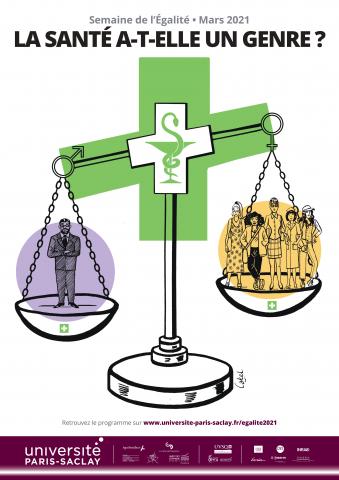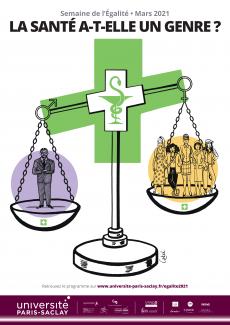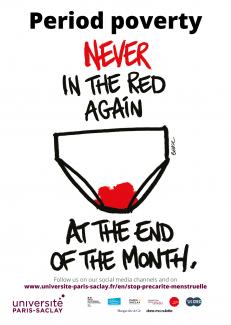
Gender Equality Week 2021: “Does health have a gender?”
As part of International Women’s Day, Université Paris-Saclay is organising, for the sixth year running, a Gender Equality Week throughout the month of March on “Gender and Health”.
Whether it is access to healthcare, medical practices, training or management, inequality and discrimination in the health sector are an undeniable reality. The French High Council for Gender Equality (Haut Conseil à l'Egalité entre les Femmes et les Hommes) has highlighted these inequalities in its report “Taking sex and gender into account for better healthcare: a public health issue” (Prendre en compte le sexe et le genre pour mieux soigner, un enjeu de santé publique). With the global health pandemic acting as a catalyst, we can no longer ignore the women working on the frontline in undervalued jobs, at greater risk of poverty and gender-based violence, more likely to be burdened by mental loads, and, as a result, less available for their research and professional development. As Simone de Beauvoir once said, “Naming something is to expose it, and exposing something is in itself a form of action.”
Starting on 8 March and throughout the month, let us name and expose these inequalities through the drawings created by the illustrator, Catel, and a series of online webinars, exhibitions, round-table discussions and conferences. Let us act together to achieve greater equality in health.
The agenda
“Does health have a gender?” - a virtual exhibition from the illustrator Catel
You can access the virtual exhibition on gender and health, created by the illustrator Catel by clicking here. The Covid-19 health crisis has transformed our daily lives and accentuated existing inequalities for women at home, in the workplace and even in the type of medical treatment and healthcare they receive. Mental loads during lockdown, Toxic Shock Syndrome, gynaecological violence…the illustrator Catel explores these inequalities through her twenty drawings in this exhibition.
The exhibition will also be available from 8 March at the University Library, rue du Doyen-Poitou 91405, Orsay cedex (Building 407).
See the exhibition here
You can also download the communication pack for the week here: https://cirrus.universite-paris-saclay.fr/s/PB4WopHQ7F7yiJt
Exhibitions, debates, talks, round-table discussions…all online!
- Thursday 4 March, 6pm, ‘Fighting harassment’ (Lutte contre les harcèlements): this webinar will present the measures aimed at fighting discrimination and harassment, with the participation of Clasches (webinar for PhD students).
-
Monday 8 March, 9.30-11.30am, ‘Shall we talk about excision?!’ (L'excision, on en parle ?!), featuring testimonies and expert speakers, Hawa Camara, Clinical Psychologist, AP-HP, Hôpital Cochin, Doctor in Psychology at Université Paris Descartes. Link to the event (code to access the webinar: 36607)
-
Monday 8 March, 5.30-7.30pm, ‘Professional gender equality for engineers’ (L'égalité professionnelle hommes-femmes chez les Ingénieur·e·s), online round-table discussion organised by CentraleSupélec. Register here and attend the round-table here.
- Tuesday 9 March, 12-1.30pm, ‘The wellbeing of LGBT students in higher education’ (Bien-être des étudiant.e.s LGBT dans l'enseignement supérieur), featuring Suzanne Robin-Radier, research engineer and member of the association, EclairE, Lucie Pallesi, PhD student at the Faculty of Sport Sciences under the supervision of Anaïs Bohuon, Professor at the Faculty of Sport Sciences at Université Paris-Saclay and social historian.
-
Thursday 11 March, 6.30-8pm, ‘How and why is the health crisis widening the gap between men and women?’ (Comment et pourquoi la crise sanitaire creuse les écarts entre les femmes et les hommes ?), featuring experts from ENS Paris-Saclay. Register here for the webinar.
- Friday 12 March, 12.30-2pm ‘Taking sex and gender into account for better healthcare’ (Prendre en compte le sexe et le genre pour mieux soigner), the French High Council for Gender Equality (Haut Conseil à l'Egalité entre les Femmes et les Hommes - HCEfh), featuring Paola Bergs, Secretary General for the HCEfh, and Catherine Vidal, researcher in neurobiology, associate expert and rapporteur.
- Thursday 18 March, 12-2pm, Conference on gender inclusive communication, featuring Eliane Viennot, Professor Emerita in French Renaissance Literature, Literary historian and critic.
-
Thursday 25 March, 12.30-2pm, ‘Does sport have a gender?’ (Le sport a-t-il un genre ?), online round-table discussion featuring Christian Bordeleau, member of the artistic swimming section for the Paris Aquatique club, Alice Delmer, ENS Paris-Saclay alumni and hammer thrower, Anne Schmitt, sociologist, and Nathalie Sonnac, professor and member of the Board of the Conseil supérieur de l’audiovisuel (link to come).
If you would like to attend one or all of these webinars, you can register via the button below.
Period poverty campaign
This year Université Paris-Saclay is committing to the fight against period poverty, an intolerable form of poverty that affects students in particular. The campaign will be launched on 8 March 2021.
Women are more affected by poverty than men, particularly those aged between 18 and 29 (1)
8% of women and girls surveyed said that they don't change their sanitary protection as often as they should due to a lack of resources (2)
On average, a woman will spend €4,500 on sanitary protection throughout her lifetime (3)
Today, many students find themselves unable to attend their lectures because sanitary products are too expensive. Others do not have the possibility of choosing the type of protection they use, e.g. organic or reusable products. No one should have to choose sanitary products over other needs, or not be able to use adequate protection. Using sanitary products incorrectly can result in health complications, i.e. Toxic Shock Syndrome, and makeshift sanitary protection can also cause infections and other health problems. These intolerable situations lead to unequal opportunities.
That is why Université Paris-Saclay has decided, with the help of the association Marguerite & Cie, to install sanitary protection dispensers throughout its institutions to allow its most financially vulnerable students to have their periods without worrying about the cost.
A series of cartoons from the illustrator Besse will be shared on our social media channels to illustrate the campaign and raise awareness.
You can find out more about the period poverty campaign on this webpage: https://www.universite-paris-saclay.fr/en/stop-precarite-menstruelle
Follow the illustrations for the campaign on our social media channels:
Facebook: https://www.facebook.com/UParisSaclay
Twitter: https://twitter.com/UnivParisSaclay
Instagram: https://www.instagram.com/universite_paris_saclay/
LinkedIn: https://www.linkedin.com/school/universit%C3%A9-paris-saclay/?originalS…
The operation has received funding from the Student and Campus Life Contribution fund, the Prefecture of the Ile de France region, the Essonne Department, the Paris-Saclay Urban Community and the student welfare office in Versailles, the Crous. It is also supported by the Fondation Paris-Saclay Université.
Notes:
1. https://www.insee.fr/fr/statistiques/3567016
2. According to a survey conducted by IFOP (Institut français d'opinion publique)
3. https://www.bloodygoodperiod.com/

